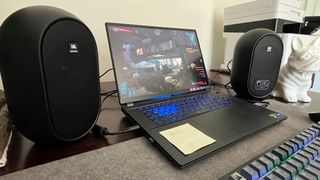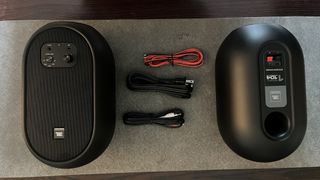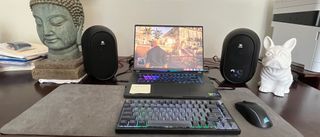JBL
104-BT:
Two-minute
review

(Image
credit:
Future
/
James
Holland)
The
JBL
104-BT
are
great
speakers
if
you
get
them
for
the
right
reason.
If
you’re
looking
for
the
best
computer
speakers
for
general
use,
you’ll
be
very
happy
with
these,
thanks
to
a
warm-leaning
yet
full
frequency
range
that
lends
itself
well
to
music
listening
as
well
as
gaming
and
streaming
(as
long
as
you
don’t
need
any
real
sub-bass).
They’re
not
quite
as
immersive
as
the
best
gaming
headsets,
but
they’re
more
than
immersive
enough.
However,
reference
monitors
they
are
not.
If
you’re
trying
to
put
together
a
home
studio,
you
want
monitors
that
give
you
an
accurate
representation
of
what
you’re
working
on.
If
you
have
speakers
that
have
somewhat
of
a
boost
in
the
low-mids
as
these
do,
then
when
you
go
to
listen
to
your
music
on
other
speakers
or
headphones,
you’ll
realize
that
you
compensated
for
that
boosted
area
and
have
a
track
that’s
lacking
in
that
same
frequency
range.
Keep
that
in
mind
when
going
through
this
review
as
these
are
very
enjoyable
to
listen
to,
are
relatively
affordable,
and
come
with
the
appropriate
amount
of
features
(minus
one
or
two).
That’s
why
you
should
consider
them
–
not
for
music
production.
JBL
104-BT:
Price
and
availability
-
How
much
does
it
cost?
$149.00
/
£199.99
/
AU$289.00 -
When
is
it
available?
Available
now -
Where
can
you
get
it?
Available
in
the
US,
UK
and
Australia
The
JBL
104-BT
aren’t
the
cheapest
computer
speakers
out
there,
but
they’re
pretty
affordable
at
$149.00
/
£199.99
/
AU$289.00.
Considering
the
sound
quality,
that’s
pretty
good
value
as
well.
Of
course,
for
that
price,
the
JBL
104-BT
should
include
a
sub
out
at
the
very
least.
As
far
as
alternatives
go,
the
Edifier
MR4
are
worth
a
consideration.
They
go
for
slightly
less
at
$129.99
/
£109.99
/
AU$179.99,
and
they
actually
work
a
bit
better
for
reference
speakers,
but
also
miss
out
on
that
low-end.
If
you’re
looking
for
a
pair
of
computer
speakers
for
reference
work,
the
Vigilant
Audio
SwitchOne
I
reviewed
back
in
2022
are
still
a
fantastic
option,
since
they
use
passive
radiators
on
the
side
to
fill
out
that
low
end.
Of
course,
they
retail
for
a
bit
more
at
$249
(£255
/
AU$471).
If
you
want
a
subwoofer
and
are
willing
to
spend
a
bit
more,
however,
the
Kanto
Ora,
with
a
price
tag
of
$349.99
/
AU$699.95
(about
£287),
are
really,
really
good.
They
work
fairly
well
as
reference
speakers
as
well,
though
they
have
a
slightly
scooped
mid-range.
-
Value:
4.5
/
5
JBL
104-BT:
Specs
to
scroll
horizontally
|
Frequency range: |
60–20,000 Hz |
| Drivers: |
2x 4.5-inch mid-range drivers, 2x 3/4-inch tweeters |
|
Supported connectivity: |
⅛-inch aux, TRS balanced, RCA line level, Bluetooth 5.0 |
|
Audio inputs: |
⅛-inch aux, TRS balanced, RCA line level |
| Outputs: |
Headphone out |
JBL
104-BT:
Design

(Image
credit:
Future
/
James
Holland)
Before
we
dig
in
much
more
about
why
they’re
good
for
certain
things
and
not
for
others,
let’s
discuss
the
JBL
104-BT’s
design.
These
speakers
come
in
either
a
matte
black
or
matte
white
colorway,
with
the
one
I
received
for
testing
coming
in
black.
They
stand
at
a
little
under
ten
inches
tall
and
six
inches
wide
(they
have
a
depth
of
almost
five
inches),
which
is
fairly
diminutive
for
a
pair
of
speakers.
Sure,
you
can
find
smaller,
but
they’re
probably
going
to
have
a
thinner
or
brighter
sound.
They
both
contain
a
4.5-inch
driver
and
a
0.75-inch
soft
dome
driver
for
the
highs,
though
I
can
only
see
the
larger
one
through
the
front
grille.
Both
speaker
boxes
are
ported
on
the
back
as
well
to
improve
bass
response.
Since
these
are
powered
speakers,
one
of
them
is
a
little
heavier
at
4.54
lbs
compared
to
the
other’s
weight
of
3.81
lbs.
While
they
connect
to
each
other
with
basic
red
and
black
speaker
wires,
the
one
with
the
power
amp
also
allows
⅛-inch
aux,
RCA,
and
TRS
balanced
inputs,
not
to
mention
Bluetooth
connectivity.
While
most
of
the
inputs
are
on
the
back,
the
aux
input
is
on
the
front
along
with
a
headphone
out
and
the
controls,
including
a
backlit
volume
knob
and
an
input
selector.
There’s
also
an
LED
indicator
when
you
have
something
connected
via
Bluetooth.
Unfortunately,
there’s
no
sub
out
–
a
fateful
omission
as
we’ll
discuss
later.
And,
though
far
from
a
deal
breaker,
there’s
no
physical
digital
connectivity
like
USB.
Considering
the
digital-to-audio
converters,
or
DACs,
that
come
in
computers
and
laptops
vary
quite
a
bit,
it
would
have
been
a
nice
inclusion.
JBL
104-BT:
Performance
 side of a gaming laptop” srcset=”https://cdn.mos.cms.futurecdn.net/7t9yh5y3nxBZVHzfmHzaok-320-80.jpg 320w, https://cdn.mos.cms.futurecdn.net/7t9yh5y3nxBZVHzfmHzaok-480-80.jpg 480w, https://cdn.mos.cms.futurecdn.net/7t9yh5y3nxBZVHzfmHzaok-650-80.jpg 650w, https://cdn.mos.cms.futurecdn.net/7t9yh5y3nxBZVHzfmHzaok-970-80.jpg 970w, https://cdn.mos.cms.futurecdn.net/7t9yh5y3nxBZVHzfmHzaok-1024-80.jpg 1024w, https://cdn.mos.cms.futurecdn.net/7t9yh5y3nxBZVHzfmHzaok-1200-80.jpg 1200w” sizes=”(min-width: 1000px) 970px, calc(100vw – 40px)” loading=”lazy” data-original-mos=”https://cdn.mos.cms.futurecdn.net/7t9yh5y3nxBZVHzfmHzaok.jpg” data-pin-media=”https://cdn.mos.cms.futurecdn.net/7t9yh5y3nxBZVHzfmHzaok.jpg”/>
side of a gaming laptop” srcset=”https://cdn.mos.cms.futurecdn.net/7t9yh5y3nxBZVHzfmHzaok-320-80.jpg 320w, https://cdn.mos.cms.futurecdn.net/7t9yh5y3nxBZVHzfmHzaok-480-80.jpg 480w, https://cdn.mos.cms.futurecdn.net/7t9yh5y3nxBZVHzfmHzaok-650-80.jpg 650w, https://cdn.mos.cms.futurecdn.net/7t9yh5y3nxBZVHzfmHzaok-970-80.jpg 970w, https://cdn.mos.cms.futurecdn.net/7t9yh5y3nxBZVHzfmHzaok-1024-80.jpg 1024w, https://cdn.mos.cms.futurecdn.net/7t9yh5y3nxBZVHzfmHzaok-1200-80.jpg 1200w” sizes=”(min-width: 1000px) 970px, calc(100vw – 40px)” loading=”lazy” data-original-mos=”https://cdn.mos.cms.futurecdn.net/7t9yh5y3nxBZVHzfmHzaok.jpg” data-pin-media=”https://cdn.mos.cms.futurecdn.net/7t9yh5y3nxBZVHzfmHzaok.jpg”/>
(Image
credit:
Future
/
James
Holland)
As
far
as
the
sound
quality
goes,
it’s
worth
repeating
that
these
are
solid
sounding
speakers
that
are
pleasing
to
listen
to,
but
are
not
appropriate
for
music
production
work,
podcasters
possibly
notwithstanding.
Since
there’s
no
subwoofer
or
sub
out,
you’re
limited
on
the
low
end.
The
JBL
104-BT
only
goes
down
to
60Hz
(a
low
note
on
a
standard
bass
is
41Hz
for
reference).
This
means
that
anything
that
needs
that
low
end
to
really
come
alive
–
hip
hop,
EDM,
or
games
and
movies
with
massive
amounts
of
explosions
–
are
going
to
feel
a
bit
truncated.
That
doesn’t
mean
you
won’t
feel
some
of
the
impact
of
those
808
drums
or
the
rumble
of
whatever’s
happening
in
the
latest
Nolan
movie.
You
just
won’t
feel
all
of
it.
That
said,
there’s
a
boost
in
the
low-mids
to
compensate
for
that.
This
boost
is
probably
the
biggest
deterrent
for
using
these
speakers
as
reference
monitors.
However,
it
adds
a
richness
and
fullness
to
any
audio
that
also
makes
these
speakers
very
pleasing
to
listen
to.
There’s
also
plenty
of
punch
and
immediacy
to
what
you’re
hearing,
so
that
while
you
won’t
feel
your
bones
shaking
from
subwoofer-level
rumble,
there’s
still
a
visceral
element
to
the
sound.
The
rest
of
the
mids
sit
nicely
in
the
mix,
while
the
high-end
is
present
in
a
pleasing
way.
The
high-end
isn’t
too
sharp
and
it
isn’t
too
muted
either.
Where
I’m
actually
most
impressed
with
the
JBL
104-BT
is
its
sound
imaging,
and
by
extension,
the
soundstage.
The
soundstage
with
speakers
are
all
about
placement
so
you
can
affect
how
wide
something
sounds
just
by
how
far
apart
the
speakers
are.
Still,
these
speakers
did
a
good
job
of
making
you
feel
that
separation
of
audio
elements
that
are
only
on
the
left
or
right
side,
not
to
mention
moving
around.
However,
what
really
jumped
out
at
me
was
the
center
channel.
The
JBL
104-BT
is
a
stereo
speaker
system
with
just
two
speaker
boxes.
But,
with
every
stereo
speaker
system,
you
really
have
the
left,
the
right,
and
the
center,
even
if
it’s
not
represented
by
its
own
physical
speaker.
Good
speakers,
along
with
good
speaker
placement,
are
able
to
make
that
center
audio
–
usually
dialogue
or
vocals
–
sound
like
it’s
floating
right
in
front
of
you
instead
of
sounding
like
part
of
it
is
coming
from
one
speaker
and
part
of
it
is
coming
from
the
other.
With
the
JBL
104-BT,
that
center
channel
felt
like
it
was
right
in
front
of
me
to
the
point
that
I
kept
checking
the
speakers
on
the
laptop
to
make
sure
they
weren’t
also
getting
in
on
the
action
(they
weren’t).
Considering
these
retail
for
around
$150,
what
you’re
getting
is
pretty
remarkable
as
long
as
you
use
them
to
elevate
your
everyday
audio
experience.
If
you’re
using
them
for
music
production,
you’ll
probably
like
the
way
they
sound,
minus
that
low-end,
but
you’re
going
to
have
a
hard
time
creating
music
that
sounds
good
on
other
systems.
If
you
keep
that
in
mind,
these
are
an
easy
pair
of
speakers
to
recommend.
Should
I
buy
JBL
104-BT
Compact
Desktop
Reference
Monitors?
to
scroll
horizontally
| Attributes | Notes | Rating |
|---|---|---|
| Value |
Though you can find cheaper, these speakers are very affordable. |
4.5 / 5 |
| Design |
They don’t take up much desk space, but are missing a sub out and USB connectivity. |
4 / 5 |
| Performance |
The low-end is pretty weak, but the rest of the frequency range is full and rich. Plus, the soundstage is very good. |
4 / 5 |
|
Average rating |
A good price, solid sound, and decent feature set are only held back by the fact that the frequency range isn’t appropriate for reference work. |
4 / 5 |
Buy
it
if…
Don’t
buy
it
if…
Also
Consider
to
scroll
horizontally
|
Frequency range: |
60 – 20,000Hz |
| Drivers: |
1-inch tweeters, 4-inch woofers |
|
Supported Connectivity: |
Analog only |
|
Audio Inputs: |
RCA, TRS, 3.5mm Aux |
| Outputs: |
3.5mm headphone jack |
to
scroll
horizontally
|
Frequency range: |
70 – 22,000 Hz, 35 – 175 Hz (sub) |
| Drivers: |
2x 3-inch mid-range drivers, 2x 3/4-inch tweeters |
|
Supported Connectivity: |
USB-C, RCA line level, Bluetooth 5.0 |
|
Audio Inputs: |
USB-C, RCA line level, Bluetooth 5.0 |
| Outputs: |
Sub out |
How
I
tested
the
JBL
104-BT
-
Used
regularly
for
a
couple
weeks -
Tested
with
all
sorts
of
games
and
music -
Tested
different
forms
of
connectivity
I
used
the
JBL
104-BT
Compact
Desktop
Reference
Monitors
regularly
for
a
couple
weeks.
I
used
them
to
listen
to
all
sorts
of
music
as
well
as
play
a
number
of
games
including
Cyberpunk
2077,
Hogwarts
Legacy,
Hitman,
and
Battlefield
2042.
After
using
these
speakers,
it’s
clear
that
they
are
great
for
general
use,
but
not
ideal
for
reference
work,
i.e.
music
production,
despite
the
accessible
price
tag.
I’ve
tested
a
lot
of
tech
gear
over
the
years
from
laptops
to
keyboards
and
speakers,
and
so
have
been
able
to
use
my
expertise
towards
giving
an
honest
and
fair
opinion,
not
to
mention
a
critical
eye,
to
any
product
I
test.
-
First
reviewed
July
2024

